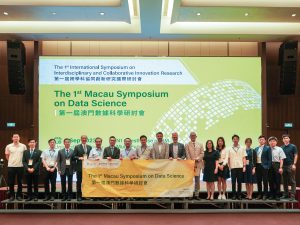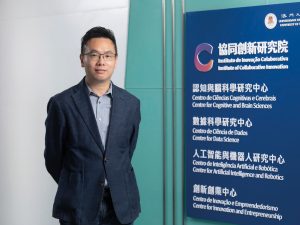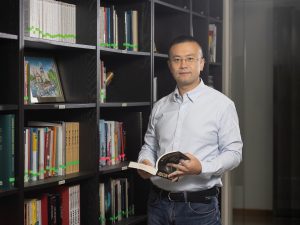In an era where every swipe, purchase, and heartbeat can be catalogued as data, the University of Macau (UM) is seizing this opportunity to transform data into actionable insights. Such efforts are evident across UM faculties, encompassing disciplines from the humanities to business, education, health sciences, law, social sciences and technology. By doing so, the university is not merely fuelling academic innovation but also contributing to social progress in Macao and beyond.
Planning the Future Through Data
‘Time present and time past. Are both perhaps present in time future.’ These words from poet T.S. Eliot encapsulate the essence of data. Far more than a historical artefact, data can serve as a lens through which we interpret the present and shape the future. Prof U Leong Hou Ryan, head of the Centre for Data Science (CDS) at UM’s Institute of Collaborative Innovation (ICI), explains, ‘Technological advancements allow data not only to represent our world, but also to act as a catalyst for innovation. Whether it is numerical, textual, visual, auditory, or video-based, data has enabled technological leaps that were not imaginable at all just a decade ago.’
Prof U, associate professor in the Department of Computer and Information Science who specialises in big data processing and reinforcement learning, says that data scientists are developing new techniques to extract insights from data. ‘The field of data science is an amalgamation of statistics, data analytics, machine learning and computer science. It is widely used in our daily life and work,’ he says. ‘Moreover, data science and machine learning are closely related. The latter refers to the process in which algorithms learn primarily from data to enhance task performance. Therefore, advancements in machine learning have in turn improved our efficiency in data collection and analysis.’
The Next Generation of Data Scientists
In collaboration with seven UM faculties, CDS offers a Master of Science in Data Science programme—the first interdisciplinary programme in big data in Macao. The programme has attracted increasing numbers of applications since its launch in August 2019. Students in this programme are required to specialise in one of these eight areas: artificial intelligence applications, marketing analytics, financial technology, data strategy and compliance, precision medicine, computational linguistics, analytics in teaching and learning, and smart governance.
The programme has four fundamental courses. They are delivered by UM’s Faculty of Science and Technology and equip students with skills in data science programming, data visualisation, database technology, and machine learning tools. In addition, students take four courses under their chosen specialisation offered by the related faculties. Throughout their studies, students may also explore the privacy, ethical, and safety issues arising from the collection and use of data, thereby delving into the broader impact of data science technologies on society.
Each student must complete a research project that integrates data science with their area of specialisation before they can graduate. Prof U says, ‘Graduates are well-positioned to work as data engineers, analysts, and scientists in a variety of sectors.’
Interdisciplinary Data Research
Beyond educational initiatives, CDS also serves as a platform for interdisciplinary research. Currently, the centre has 16 members from various UM faculties who engage in a wide range of research activities. For example, CDS collaborates with experts in law and information technology to study the role of technology in privacy protection, thus developing related technologies and offering policy recommendations. As an interdisciplinary platform, members also integrate research in health sciences, technology, and pharmacology to develop precision medicine solutions for rare diseases and common cancers.
As Macao develops a modern finance industry, CDS plays a supporting role by leveraging data analysis for the benefit of the industry. This includes using big data technologies to pioneer new applications, processes, products, and business models. Moreover, the centre has helped different UM faculties apply data science in fields such as linguistics, public administration, and data compliance. Prof U adds, ‘During the COVID-19 pandemic, our research team developed a data visualisation system which helped the Macao public better understand and adapt to the changing situation.’
Aside from its contributions to education and research, CDS also fosters interdisciplinary discussion and collaboration. For example, it has hosted roundtable discussions on cross-border data usage and organised data analysis competitions. Additionally, in September 2023, the centre hosted the 1st Macau Symposium on Data Science, which gathered experts from diverse fields including big data processing, market analytics, precision medicine, and smart governance. These initiatives have reinforced its role as a platform for interdisciplinary innovation and scholarly exchange.
Deciphering and Improving Society
Given the complexity of social phenomena, it is difficult to make comprehensive and systematic predictions about the future development of society. However, the rise of data science is changing this landscape. Prof Cai Tianji, associate dean in the Faculty of Social Sciences and head of the Department of Sociology, is a member of CDS. He is dedicated to research in computational social science. Prof Cai explains, ‘My research is twofold. First, I use data science to tackle social issues. Second, I integrate predictive analytics into social science research. With the availability of real-time data updates, we can now also verify the accuracy of predictions about social phenomena in real time.’
Prof Cai elaborates that data and machine learning models have become crucial in both the provision and study of public services. For example, in a recent research project focused on predicting the growth of solid waste in Macao, Prof Cai developed multiple machine learning models and found that ‘Generalised Additive Models’ made the most accurate predictions. He says, ‘Macao ranks among the top in the world in terms of per capita solid waste generation, outpacing Hong Kong, Shanghai, and Singapore. The sources of solid waste in Macao are varied and influenced by factors such as family structure, tourist influx, and construction activity.’
Prof Cai further explains how changes in family structure and the declining birth rate in Macao will affect the proportion of waste types, in addition to affecting the overall amount of waste. ‘For instance, smaller households, especially those without children, are more likely to order takeaway food than cooking at home, thereby increasing the use of plastic utensils,’ he notes. In view of this, Prof Cai hopes to develop more robust models to predict the overall amount of waste and the amount of each type of waste, which can help with the planning of waste sorting and processing facilities in Macao.
Exploring Communication Processes
Data science enhances our understanding of communication, whether between individuals or groups. Zhao Xinshu, chair professor in the Department of Communication and a member of CDS, employs big data analytics in communication studies. He says, ‘In today’s digital age, people have ready access to abundant real-time information. However, there’s a significant caveat: we are increasingly likely to only receive information that aligns with our viewpoints, which may lead to wider division among the public. Rigorous big data analytics is therefore essential for exploring these issues.’
Prof Zhao expands on the concept of ‘selective spiral’, which is formed as information is disseminated, received, and reposted on social media. ‘In our examinations of social media platforms in mainland China, post creators can mostly lead the selective spiral in the initial stage. However, as the spiral continues, it will be more heavily influenced by the preferences of people who like, share, and read the post, leading to the formation of an “echo chamber” in online public opinion,’ he explains.
In a recent study, Prof Zhao and his team used big data technologies to collect and analyse Chinese-language social media posts, so as to understand the impact of headline length on click-through and share rates. The study shows that readers generally prefer medium-length headlines, with a length of around 28 characters as optimal. On the other hand, sharers favour shorter headlines, with an ideal length of no more than 20 characters. ‘Such findings not only shed light on online public opinion in mainland China but also provide guidance for marketing strategies,’ he concludes.
Applying Data Science Across Industries
Data science serves not just as a conduit between the past, present, and future, but also as a nexus among different communities and phenomena. It fosters innovation and new methodologies in different sectors. Prof U states, ‘Through rigorous interdisciplinary collaboration, CDS is cultivating a new generation of data scientists. The centre engages in extensive interdisciplinary research to promote in-depth knowledge exploration and create predictive models. Such endeavours facilitate the application of data science in all aspects of life, thereby supporting the development of emerging technologies and making contributions to society.’
Chinese & English Text / Davis Ip
Photo / Jack Ho, Editorial Board
Source: UMagazine ISSUE 28
Related articles:
- Applying AI in Novel Ways
- Marketing to Minds With Data
- Extracting Financial Value From Big Data
- Building Trust Through Data Compliance
- Crafting Tailored Cures Through Data
- Developing a Common Language for Humans and Machines
- Data Science Driving Personalised Education
- Leveraging Data to Enhance Public Services






